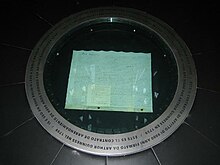Arthur Guinness
Arthur Guinness | |
|---|---|
 | |
| Born | 1724 or 1725 |
| Died | 23 January, 1803 Mountjoy Square, Dublin |
| Resting place | Oughter Ard, Kildare |
| Nationality | Kingdom of Ireland |
| Occupation(s) | Brewer and businessman |
| Known for | Founder of Guinness |
| Spouse | Olivia Whitmore |
| Children | 21 |
Arthur Guinness (1724 or 1725 – 23 January 1803) was an Irish brewer and the founder of the Guinness brewery business and family. He was also an entrepreneur, visionary and philanthropist.
At 27, in 1752, Guinness's godfather Arthur Price, the Church of Ireland Archbishop of Cashel, bequeathed him £100 in his will. Guinness invested the money and in 1755 had a brewery at Leixlip, just 17 km from Dublin. In 1759, Guinness went to the city and set up his own business. He took a 9,000 year lease[1] on the 4-acre (16,000 m2) brewery at St. James's Gate from the descendants of Sir Mark Rainsford for an annual rent of £45.
Guinness's florid signature is still copied on every label of bottled Guinness.
Background
Arthur Guinness was born into the Irish Protestant Guinness family, claimed to descend from the Gaelic Magennis clan of County Down.[2] Recent DNA evidence however suggests descent from the McCartans, another County Down clan, whose spiritual home lay in the townland of Guinness near Ballynahinch, County Down.[3]
Guinness's place and date of birth are the subject of speculation. His gravestone in Oughterard, County Kildare says he died on 23 January 1803, at age 78, indicating that he was born some time in 1724 or very early in 1725. This contradicts the date of 28 September 1725 chosen by the Guinness company in 1991, apparently to end speculation about his birthdate.[4] The place of birth was perhaps his mother's home at Read homestead at Ardclough County Kildare.[5]
In 2009 it was claimed he was born in nearby Celbridge[6] where his parents lived in 1725 and where his father later became land steward for the Archbishop of Cashel, Dr. Arthur Price, and may have brewed beer for the other workers on the estate. In his will, Dr. Price left £100 each to Arthur and his father in 1752.

In 1761 he married Olivia Whitmore in St. Mary's Church, Dublin, and they had 21 children, 10 of whom lived to adulthood. From 1764 they lived at Beaumont House, which he had built on a 51-acre (21 ha) farm, which is now a part of Beaumont Convalescent Home, behind the main part of Beaumont Hospital, between Santry and Raheny in north County Dublin. Beaumont (meaning beautiful hill) was named by him and the later Beaumont parish copied his original name. In his latter years he lived at Mountjoy Square in Dublin, which was then in the process of being built in the style of elegant Georgian architecture. Three of his sons were also brewers, and his other descendants eventually included missionaries, politicians, and authors (see: Guinness family).
He was buried in his mother's family plot at Oughterard, County Kildare in January 1803.
In October 2013 a statue of him was erected in his birthplace Celbridge.[7]
Politics
Guinness supported Henry Grattan in the 1780s and 1790s, not least because Grattan wanted to reduce the tax on beer. He was one of the four brewers' guild representatives on Dublin Corporation from the 1760s until his death. Like Grattan, Guinness was publicly in favour of Catholic Emancipation from 1793, and was not a supporter of the United Irishmen during the 1798 rebellion.
Brewer of porter

Guinness leased a brewery in Leixlip in 1755, brewing ale. Five years later he left his younger brother in charge of that enterprise and moved on to another in St. James' Gate, Dublin, at the end of 1759. Visitors to the brewery can see the 9,000-year lease he signed for it, effective from 31 December 1759. By 1767 he was the master of the Dublin Corporation of Brewers. His first actual sales of porter were listed on tax (excise) data from 1778, and it seems that other Dublin brewers had experimented in brewing porter beer from the 1760s. His major achievement was in expanding his brewery in 1797–99. Thereafter he brewed only porter and employed members of the Purser family who had brewed porter in London from the 1770s. The Pursers became partners in the brewery for most of the 19th century. By his death in 1803 the annual brewery output was over 20,000 barrels. Subsequently Arthur and/or his beer was nicknamed "Uncle Arthur" in Dublin.
Arthur Guinness Fund
To further honour Arthur Guinness's legacy, in 2009 Guinness & Co. established the Arthur Guinness Fund (AGF). An internal fund set up by the Company, its aim is to enable and empower individuals with skills and opportunities to deliver a measured benefit to their communities.[8] Guinness has donated more than €7 million to the Fund since its inception.
See also
References
- ^ The Story: "1759: It begins with a signature" Official web site. Retrieved< 22 October 2013.
- ^ Robert Bell "The Book of Ulster Surnames", published 1997
- ^ Guinness origins begin to settle
- ^ Visit to Oughterard by Kerry J Byrne
- ^ Corry, Eoghan and Tancred, Jim "The Annals of Ardclough" pp70-71 (2004)
- ^ Plaque Unveiled in Celbridge to honour Birth Place of Arthur Guinness
- ^ http://www.leinsterleader.ie/news/local-news/arthur-guinness-arrives-home-to-celbridge-1-5578650 Leinster Leader, October 2013
- ^ Arthur Guinness Fund
Bibliography
- D. Wilson, Dark and Light (Weidenfeld, London 1998) ISBN 0-297-81718-3
- M. Guinness, The Guinness Spirit (Hodder, London 1999) ISBN 0-340-72165-0
